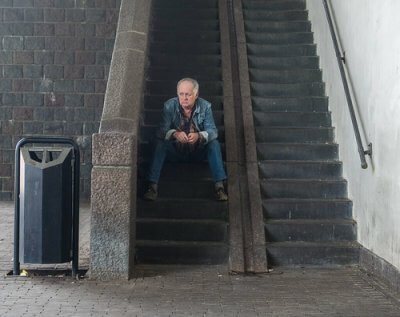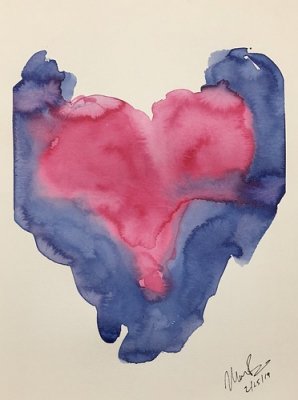Anticipatory Grief – Is This Why You Are So Sad?

photo by Joshua Rawson
Has difficult world or family news seen you randomly breaking into tears? Feel heartbroken, and like all the sadness of the world is upon you? You might have what’s known as ‘anticipatory grief’.
What is anticipatory grief?
Anticipatory grief means we feel grief not after a loss, but in advance of it happening. We know the loss is inevitable, and it’s as if we prepare ourselves. Some see it as a sort of coping mechanism.
The term was coined by psychiatrist Erich Lindemann during the Second World War, when he noticed that relatives of soldiers passed through the stages of grief when the solider was at war. He saw that the grief was so thorough that sometimes, if the soldier actually survived and went home, the family rejected him. (1)
The term became popular in the 1970s, when psychologists found that those released from jail or long hospital stays sometimes faced families that had grieved the loss and developed new ways of being that no longer included them.
How is anticipatory grief different than regular grief?
Regular grief can come in waves for a very long time, and can feel endless.
Anticipatory grief of course ends when the tragedy actually comes. In the case of Covid-19, for example, this might be when someone you knew, or even a friend of someone you knew, passed away. The situation is ‘real’. And from there you can work to accept it.

By: Georgie Pauwels
In other ways, anticipatory grief tends to be very similar to regular grief.
What are the symptoms of anticipatory grief?
Signs of anticipatory grief can include the different ‘stages’ of grief:
- shock or disbelief
- denial
- bargaining
- guilt
- anger
- depression
- acceptance/hope.
Other signs can include:
- anxiety
- foggy thinking
- feeling very emotional, random crying
- irritability
- overreacting to things (getting angry over small things)
- hopelessness
- mood swings
- loneliness
- social withdrawal
- negative thinking.
And grief can involve physical symptoms, such as:
- fatigue
- nausea
- lack of appetite or overeating
- sleep problems.
What it can mean if you are grieving in advance
Anticipatory grief can, again, be seen as a coping mechanism.

By: Mark Bonica
But despite original assumptions that it was a positive coping mechanism, a sort of ‘dress rehearsal’ to allow us to prepare for bereavement? So the loss would be less difficult? Recent research has not necessarily agreed.
It would instead suggest that if you are suffering from feelings of grief in advance of a tragedy you are expecting? It is a sign you need to work on your mental health to weather what lies ahead.
A study completed by 159 spouses of deceased cancer patients during the three months after they lost their partner found that anticipatory grief correlated with depression and subjective stress. This shows that anticipatory grief can mean you are more likely to struggle with actual bereavement and adjusting to loss than other people.
Although that might depend on how long your anticipatory grief goes on. An earlier study looking at elderly widow and widowers whose spouses had died after illness found that if the illness was short, anticipatory grief didn’t have post-mortem effects. (2) But if the anticipatory grief went on for more than six months, the ‘extended death watch’ made them more likely to seek medical attention and complain of feeling ill in the aftermath.
What if it’s my own death I sense?
A premonition of death that happens to be your own death does not mean you are going to die. It could be death anxiety at play. Note if the premonition comes with other markers of fear of death and dying, such as worries about leaving others behind, of not having done enough with your life, or fear of pain and suffering.
But it’s helpful not to obsess or focus on your premonition. A study published in “The American Surgeon” surveyed 302 trauma surgeons dealing with people after serious injury.
It found that fifty per cent felt that if their patients believed they had a premonition of death they had a higher mortality rate. Note that fifty seven of these surgeons also felt that a patient’s willpower affected this outcome.
Of course theses were trauma patients who already had high chances of death. But the lesson here is that the idea that our thoughts and willpower affect reality is not a science, but surgeons facing life and death daily think it might have some play in things. So why not focus on living instead?
What should I do if I am experiencing anticipatory grief?
It’s important to find someone you trust to talk to.
In strange times globally, you might find that others are feeling anticipatory grief as well, and together you can share your feelings and thoughts.
Just admitting you are sad about the deaths of strangers and the loss of the world you loved can be healing. Other useful tools can be journalling and mindfulness, which encourages us to allow our emotions to exist without judgement.
If you feel that your anticipatory grief is starting to negatively affect your ability to cope and get on with your life, then it might be that it is triggering other, unresolved losses in your past. Or that you are developing depression. In this case it’s advisable to reach out for some professional help, such as talking to a counsellor.
Need someone to talk to about your sadness that will actually understand? Or top London therapists are now booking online appointments. Or use our booking site for a wide selection of UK-wide online talk therapists.
Still have a question about anticipatory grief? Post below.
FOOTNOTES
(1) Sweeting, Helen & Gilhooly, Mary. (1990). Anticipatory grief: A review. Social science & medicine (1982). 30. 1073-80. 10.1016/0277-9536(90)90293-2
(2) Gerber I., Rusalem R., Hannon N., Battin D. and Arkin A. Anticipatory grief and aged widows and widowers. J. Gerontol. 30, 225-229, 1975




